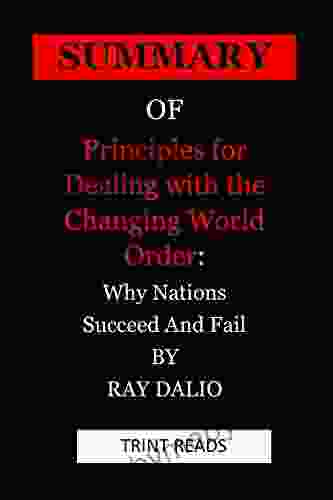Why Nations Succeed And Fail: A Comprehensive Review

5 out of 5
| Language | : | English |
| File size | : | 148 KB |
| Text-to-Speech | : | Enabled |
| Screen Reader | : | Supported |
| Enhanced typesetting | : | Enabled |
| Word Wise | : | Enabled |
| Print length | : | 18 pages |
| Lending | : | Enabled |
Ray Dalio's 'Why Nations Succeed And Fail' is a monumental work that has captivated the minds of economists, historians, and policymakers alike. This comprehensive and meticulously researched book delves into the intricate factors that shape the economic rise and fall of nations throughout history. Dalio, a renowned investor and founder of Bridgewater Associates, presents a compelling framework to understand the economic forces that determine a nation's destiny.
The book is divided into three main parts. Part I provides a historical overview of economic cycles, highlighting the patterns of growth, stagnation, and decline that have characterized nations over the centuries. Part II explores the specific factors that contribute to a nation's success or failure, including government policies, central banks, monetary policy, fiscal policy, geopolitical factors, and cultural factors. Part III focuses on the future of global economies, offering insights into the challenges and opportunities that nations will face in the coming decades.
Key Concepts
At the heart of Dalio's analysis is the concept of 'the economic machine.' This machine consists of five key elements: productivity, education, innovation, infrastructure, and the political system. When these elements are functioning well, the economic machine runs smoothly, leading to sustained economic growth and prosperity. However, when any of these elements are disrupted, the machine can break down, resulting in economic decline.
Another key concept is that of 'the long-term debt cycle.' Dalio argues that all economies go through cycles of debt and deleveraging. During the debt cycle, a nation borrows heavily to finance government spending, investment, and consumption. As the debt accumulates, interest payments become a growing burden on the economy, leading to a slowdown in growth and a need for fiscal austerity. The deleveraging phase involves reducing the debt burden through a combination of spending cuts, tax increases, and inflation.
Dalio also emphasizes the importance of 'big cycles.' These are long-term cycles that span generations and are driven by technological innovation, geopolitical shifts, and demographic changes. Big cycles can lead to major economic transformations, such as the Industrial Revolution or the rise of China.
Factors Contributing to National Success
According to Dalio, there are several key factors that contribute to a nation's success. These include:
- Strong government institutions: Governments that are stable, transparent, and accountable tend to promote economic growth and stability.
- Sound economic policies: Governments that implement sound economic policies, such as balanced budgets, low inflation, and open trade, create a favorable environment for investment and innovation.
- Central bank independence: Central banks that are independent from political interference can better manage monetary policy and maintain price stability.
- Investment in education and infrastructure: Nations that invest heavily in education and infrastructure create a skilled workforce and a foundation for economic growth.
- Cultural values: Countries with cultures that value hard work, innovation, and entrepreneurship tend to be more prosperous.
Factors Contributing to National Failure
Conversely, there are several factors that can contribute to a nation's failure. These include:
- Weak government institutions: Governments that are corrupt, unstable, or inefficient can hinder economic growth and development.
- Unsound economic policies: Governments that implement unsound economic policies, such as excessive spending, high inflation, and protectionism, can damage the economy.
- Central bank dependence: Central banks that are dependent on political interference or that pursue overly expansionary monetary policies can lead to financial instability and inflation.
- Underinvestment in education and infrastructure: Nations that underinvest in education and infrastructure create a poorly skilled workforce and a weak foundation for economic growth.
- Cultural values: Countries with cultures that discourage hard work, innovation, and entrepreneurship tend to be less prosperous.
The Future of Global Economies
In the final part of the book, Dalio offers his insights into the future of global economies. He argues that the world is entering a new 'big cycle,' driven by technological innovation, geopolitical shifts, and demographic changes. This new cycle will present both challenges and opportunities for nations around the world.
Dalio emphasizes the importance of adaptability and resilience in the face of these changes. He believes that nations that are able to adapt to new technologies, geopolitical realities, and demographic shifts will be best positioned to succeed in the coming decades.
Ray Dalio's 'Why Nations Succeed And Fail' is a must-read for anyone interested in economics, history, or the future of global economies. Dalio provides a wealth of insights into the factors that shape the economic rise and fall of nations, offering valuable lessons for policymakers and citizens alike.
The book is a comprehensive and thought-provoking work that will undoubtedly continue to shape the economic discourse for years to come. It is a timely and essential guide for understanding the complex challenges and opportunities that nations face in the 21st century.
5 out of 5
| Language | : | English |
| File size | : | 148 KB |
| Text-to-Speech | : | Enabled |
| Screen Reader | : | Supported |
| Enhanced typesetting | : | Enabled |
| Word Wise | : | Enabled |
| Print length | : | 18 pages |
| Lending | : | Enabled |
Do you want to contribute by writing guest posts on this blog?
Please contact us and send us a resume of previous articles that you have written.
 Book
Book Novel
Novel Page
Page Chapter
Chapter Text
Text Story
Story Genre
Genre Reader
Reader Library
Library Paperback
Paperback E-book
E-book Magazine
Magazine Newspaper
Newspaper Paragraph
Paragraph Sentence
Sentence Bookmark
Bookmark Shelf
Shelf Glossary
Glossary Bibliography
Bibliography Foreword
Foreword Preface
Preface Synopsis
Synopsis Annotation
Annotation Footnote
Footnote Manuscript
Manuscript Scroll
Scroll Codex
Codex Tome
Tome Bestseller
Bestseller Classics
Classics Library card
Library card Narrative
Narrative Biography
Biography Autobiography
Autobiography Memoir
Memoir Reference
Reference Encyclopedia
Encyclopedia Peter Inglis
Peter Inglis Veera Hiranandani
Veera Hiranandani Peter Jazwinski
Peter Jazwinski Tom Coyne
Tom Coyne Matthew Piepenburg
Matthew Piepenburg Peter B Doran
Peter B Doran Lexi Sundell
Lexi Sundell Saul David
Saul David Phil Huddleston
Phil Huddleston Peter N Peregrine
Peter N Peregrine Harold Pinter
Harold Pinter Peter Kozodoy
Peter Kozodoy Michael J Urick
Michael J Urick Steven M Nolt
Steven M Nolt Laura Zinn Fromm
Laura Zinn Fromm Ellen Potter
Ellen Potter Monica Gribben
Monica Gribben Will Hobbs
Will Hobbs Trevor Loudon
Trevor Loudon Renda Dionne Madrigal
Renda Dionne Madrigal
Light bulbAdvertise smarter! Our strategic ad space ensures maximum exposure. Reserve your spot today!

 Henry Wadsworth LongfellowThe Revolt of the Cockroach People: A Literary Masterpiece Unveiling the...
Henry Wadsworth LongfellowThe Revolt of the Cockroach People: A Literary Masterpiece Unveiling the...
 Jarrett BlairMaximize Your Modern Marketing Skills: Making More Money with SEO and Social...
Jarrett BlairMaximize Your Modern Marketing Skills: Making More Money with SEO and Social... Bryce FosterFollow ·2k
Bryce FosterFollow ·2k Ted SimmonsFollow ·4.9k
Ted SimmonsFollow ·4.9k David PetersonFollow ·10.4k
David PetersonFollow ·10.4k Jacob FosterFollow ·8.9k
Jacob FosterFollow ·8.9k Travis FosterFollow ·3.2k
Travis FosterFollow ·3.2k Logan CoxFollow ·16.1k
Logan CoxFollow ·16.1k George OrwellFollow ·2.4k
George OrwellFollow ·2.4k Billy PetersonFollow ·11.9k
Billy PetersonFollow ·11.9k

 Clay Powell
Clay PowellDiscover the Enigmatic Beauty and Profound Meaning in...
An Exploration of Emptiness, Fulfillment,...

 Brenton Cox
Brenton CoxThe Life and Times of the Woman Who Changed Abortion: The...
Norma McCorvey, the woman known...

 Darius Cox
Darius CoxBest 60 Short Hairstyles For Women With Thick Hair: A...
Embracing the beauty of...

 John Parker
John ParkerThe Healthy Pregnancy Book: Your Essential Guide to a...
Pregnancy is a...
5 out of 5
| Language | : | English |
| File size | : | 148 KB |
| Text-to-Speech | : | Enabled |
| Screen Reader | : | Supported |
| Enhanced typesetting | : | Enabled |
| Word Wise | : | Enabled |
| Print length | : | 18 pages |
| Lending | : | Enabled |












